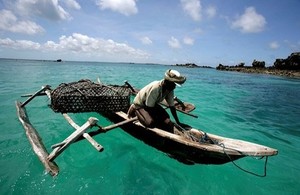UK increases commitment to protect oceans from plastics and fight illegal wildlife trade
At the Global Environment Facility conference, the UK joined 29 other international donors to recommit for a further four years to help developing countries tackle global environmental degradation.

The UK is stepping up its support to fight global environmental challenges, with a greater focus on protecting the world’s oceans and tackling the illegal wildlife trade, International Development Secretary Penny Mordaunt and Environment Secretary Michael Gove have announced today (Thursday 26th April).
At the Global Environment Facility conference in Stockholm, the UK joined 29 other international donors to recommit for a further four years to help developing countries tackle global environmental degradation.
Following pressure from the UK, this year’s Global Environment Facility replenishment will result in more funding to protect the marine environment, including from plastic waste pollution, and to tackle the illegal wildlife trade.
With this seventh round of support, the GEF is planning to protect around 600 million hectares of land and marine habitats – an area equivalent to 24 times the size of the UK – and reduce greenhouse gas emissions by 1600 million metric tonnes – the equivalent of an average car driving 4 million miles.
The UK’s commitment of up to £250 million over the next four years is an increase on the last pledge of £210 million from 2014-2018, and maintains the UK’s leadership on tackling environmental challenges that threaten global stability and security. Twenty per cent of the UK’s support is also conditional on GEF making continual improvements to achieve maximum impact.
International Development Secretary Penny Mordaunt said:
The world’s poorest communities are often the worst affected by environmental change. Extreme climates cause devastating drought and hunger, while deforestation and pollution destroy people’s livelihoods and health.
The UK’s long-running partnership with the Global Environment Facility has already achieved great change – cutting greenhouse gas emissions and protecting land – and now, we’re working with our international partners to do more so that together we can clean our oceans of plastic waste and fight the illegal wildlife trade.
This will help developing nations, but, as we are all affected by the environment, it is a win for us in the UK too.
Environment Secretary Michael Gove said:
Environmental challenges do not respect borders. It is only through co-ordinated international action that we can clean up our oceans and protect wildlife. Our funding to the Global Environment Facility makes a vital difference.
The 25 Year Environment Plan demonstrates a commitment to global leadership. It makes clear our priorities of ending the illegal trade in wildlife and reducing plastic waste. These efforts will prevent damage to our seas and the wider natural environment.
Notes to editors
- The UK Government – through the Department for International Development (DFID) and Department for Environment, Food and Rural Affairs (DEFRA) - has pledged £250 million to the Global Environment Facility (GEF) for its seventh replenishment.
- The UK’s commitment of up to £250m over 2018-2022 is an increase on the last pledge of £210m for the 2014-2018 replenishment, and maintains the UK’s leadership on tackling global environmental challenges and our position as the fourth largest contributor to the fund.
- To incentivise GEF to achieve the targets, we are making 20% of our overall replenishment funding contingent on GEF’s continual improvement and achieving maximum impact.
- The UK has sought and successfully achieved a substantial increase in GEF funding for a range of priority topics, including:
- an increase for the Global Wildlife Programme tackling the illegal wildlife trade;
- increases for managing chemicals and waste - including plastic;
- an increase for international waters in recognition of pressures on the marine environment.
- The Global Environment Facility (GEF) was set up in 1991, and supports developing countries to tackle major environmental challenges including wildlife loss, land degradation, deforestation, chemical pollution, marine and freshwater degradation, and climate change.
- Since its inception in 1991 the Global Environment Fund has successfully protected 860 million hectares of land – an area larger than Brazil – and contributed to 2.7 billion tonnes of greenhouse gas emission reductions through 760 climate change protection projects.
General media queries (24 hours)
Email mediateam@dfid.gov.uk
Telephone 020 7023 0600
If you have an urgent media query, please email the DFID Media Team on mediateam@dfid.gov.uk in the first instance and we will respond as soon as possible.